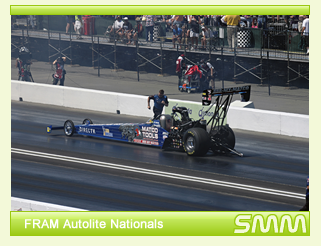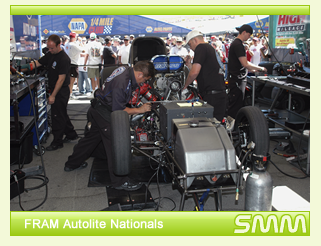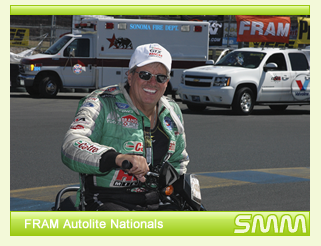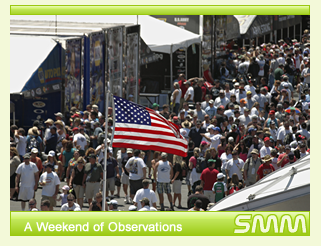
Would he or wouldn’t he? The question was repeated time and time again throughout the weekend.Would Antron Brown join the likes of John Force, Cory McClenathan, Joe Amato, Larry Dixon, Greg Anderson and Tony Shumacher to become the seventh driver in NHRA history to sweep all three western events?
Fresh from his Top Fuel wins at Denver and Seattle, Antron Brown (33), who successfully transitioned from Pro Stock Motorcycle to Top Fuel dragsters a mere two years ago, worked through the field before nearly 30,000 spectators, proving that once again consistency was the key that unlocked the door to victory. He was bound for glory and at the end of the day he had a golden broom to prove it, which he tested on the podium of the Winner’s Circle, much to the delight of the fans.
Brown’s victory didn’t come as a surprise to those who have followed his career. Since 1998, this driver has amassed a total of 23 wins, and been the only racer who has won and led the standings in both  Top Fuel and Pro Stock Motorcycle. In 2009 alone, he has won five times, been in eight final rounds, qualified#1 five times and set low E.T. six times. All this is well and good but he had to get by Troy Buff (round 1), Joe Hartley (quarterfinals), the #1 qualifier J. R. Todd (semifinals), and Cory McClenathan (finals) before his Matco Tools rail was done for the day. He’ll continue his quest at Brainerd with a comfortable lead over Tony Shumacher who’s second in the standings going into the sixteenth race of the season. Top Fuel and Pro Stock Motorcycle. In 2009 alone, he has won five times, been in eight final rounds, qualified#1 five times and set low E.T. six times. All this is well and good but he had to get by Troy Buff (round 1), Joe Hartley (quarterfinals), the #1 qualifier J. R. Todd (semifinals), and Cory McClenathan (finals) before his Matco Tools rail was done for the day. He’ll continue his quest at Brainerd with a comfortable lead over Tony Shumacher who’s second in the standings going into the sixteenth race of the season.
In nitro Funny Car, the perennial favorite John Force and his daughter, Ashley Force Hood, were eliminated in the first round by Gary Densham and Ron Capps respectively. Tim Wilkerson, one of the few top rated drivers who still turns wrenches on his car got by Jeff Arend, Bob Tasca III, Gary Densham and Tony Pedregon to earn a “Wally” for himself and his sponsor, Levi, Ray and Shoup Inc., proving once again  that deep pocket sponsorships don’t always equate with winning. that deep pocket sponsorships don’t always equate with winning.
The Pro Stock final was a battle between the Pontiac GXPs of Jason Line (6.639/208.33) and Greg Anderson (6.632@208.71). Line beat his teammate with a hole shot that carried him over the finish line less than a foot ahead of Anderson to take the win.
In ProStock Motorcycle, teammates Andrew Hines and Eddie Krawiec, in spite of a 20 pound handicap imposed on them by NHRA to help level the playing field with the other competitors, battled one another in the finals with Hines pulling out a close win 6.972@189.82 mph to Krawiec’s losing effort of 7.014@187.23 mph.
FRAM Autolite Nationals Gallery
A Weekend of Observations/An Editorial
It had been nearly 20 years since I had last attended a major NHRA event and I wasn’t sure what to expect at this year’s FRAM Autolite Nationals. Growing up in the Motor City, I had been steeped in the car culture long before the time I received my driver’s license in 1964. Weekend nights were spent street racing my 4-speed 426 Wedge Plymouth on Woodward Avenue and Telegraph Road but Sunday afternoons were reserved for a very special place located at the corner of Sibley and Dix – Detroit Dragway. I feel very fortunate to have witnessed the evolution of the early funny cars, fuelers, gassers and the super stocks that were truly “stock” then. It was something we all did, it was a part of our fabric and we did it for years. It was a sport by and for the people.
The 1960’s and 70’s have often been described as the golden years of drag racing an d over a period of another three decades the sport rapidly changed and with it, the long standing relevance for me waned when I felt the cars were becoming too homogenized/pasteurized and computers supplanted human ingenuity and design. d over a period of another three decades the sport rapidly changed and with it, the long standing relevance for me waned when I felt the cars were becoming too homogenized/pasteurized and computers supplanted human ingenuity and design.
NASCAR scratched the itch for me. It filled the void that was left when I walked away from drag racing and I was skeptical and critical of the straight line sport that I felt had lost its way with those of us who had so eagerly supported it so many years before.
Walking into the media center on Friday morning, I was surprised by the lack of security fencing and redundant guard checkpoints so prominent at the NASCAR garage. People were freely milling around the pits, children were clutching small bags of freebies and somehow I didn’t feel like I was at the National Security Agency in Fort Meade, Maryland. Most surprising was the fact that it didn’t take a hot pass credential to rub shoulders with the drivers who seemed more than willing to sign autographs and pose for pictures without a publicity representative or security person being present. How could this be? I wondered what was so different between the NASCAR vis a vis NHRA philosophies, as it pertains to their fans? It was like comparing an armed camp to a public park and the difference was something you could almost touch.
After three days at Infineon Raceway surrounded by near sell-out crowds, it became clear that NASCAR could learn something from its straight line competitor for the discretionary racing dollars they both seek. No one would know there was a recession by the numbers who packed the stands and jammed the pits for a momentary blast of nitromethane during the time the clutches were being set for the next run. It all came full circle when this author saw Antron Brown arrive early at Victory Lane and go from person to person lining the security fence, posing, talking and signing autographs for the throngs that were there to celebrate with him. At that point, it had become clear that this form of racing was a sport by and for the people once again.
|





